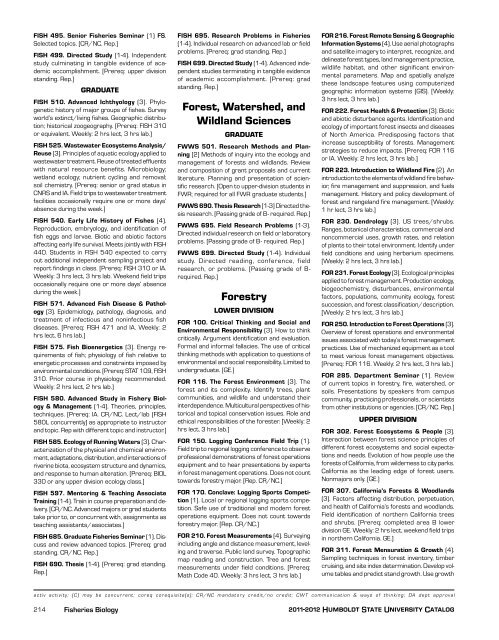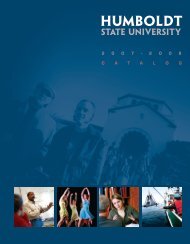2011-12 Academic Year - Bad Request - Humboldt State University
2011-12 Academic Year - Bad Request - Humboldt State University
2011-12 Academic Year - Bad Request - Humboldt State University
Create successful ePaper yourself
Turn your PDF publications into a flip-book with our unique Google optimized e-Paper software.
FISH 495. Senior Fisheries Seminar (1) FS.<br />
Selected topics. [CR/NC. Rep.]<br />
FISH 499. Directed Study (1-4). Independent<br />
study culminating in tangible evidence of academic<br />
accomplishment. [Prereq: upper division<br />
standing. Rep.]<br />
GRADUATE<br />
FISH 510. Advanced Ichthyology (3). Phylogenetic<br />
history of major groups of fishes. Survey<br />
world’s extinct/living fishes. Geographic distribution;<br />
historical zoogeography. [Prereq: FISH 310<br />
or equivalent. Weekly: 2 hrs lect, 3 hrs lab.]<br />
FISH 525. Wastewater Ecosystems Analysis/<br />
Reuse (3). Principles of aquatic ecology applied to<br />
wastewater treatment. Reuse of treated effluents<br />
with natural resource benefits. Microbiology;<br />
wetland ecology; nutrient cycling and removal;<br />
soil chemistry. [Prereq: senior or grad status in<br />
CNRS and IA. Field trips to wastewater treatment<br />
facilities occasionally require one or more days’<br />
absence during the week.]<br />
FISH 540. Early Life History of Fishes (4).<br />
Reproduction, embryology, and identification of<br />
fish eggs and larvae. Biotic and abiotic factors<br />
affecting early life survival. Meets jointly with FISH<br />
440. Students in FISH 540 expected to carry<br />
out additional independent sampling project and<br />
report findings in class. [Prereq: FISH 310 or IA.<br />
Weekly: 3 hrs lect, 3 hrs lab. Weekend field trips<br />
occasionally require one or more days’ absence<br />
during the week.]<br />
FISH 571. Advanced Fish Disease & Pathology<br />
(3). Epidemiology, pathology, diagnosis, and<br />
treatment of infectious and noninfectious fish<br />
diseases. [Prereq: FISH 471 and IA. Weekly: 2<br />
hrs lect, 6 hrs lab.]<br />
FISH 575. Fish Bioenergetics (3). Energy requirements<br />
of fish; physiology of fish relative to<br />
energetic processes and constraints imposed by<br />
environmental conditions. [Prereq: STAT 109, FISH<br />
310. Prior course in physiology recommend ed.<br />
Weekly: 2 hrs lect, 2 hrs lab.]<br />
FISH 580. Advanced Study in Fishery Biology<br />
& Management (1-4). Theories, principles,<br />
techniques. [Prereq: IA. CR/NC. Lect/lab (FISH<br />
580L concurrently) as appropriate to instructor<br />
and topic. Rep with different topic and instructor.]<br />
FISH 585. Ecology of Running Waters (3). Characterization<br />
of the physical and chemical environment,<br />
adaptations, distribution, and interactions of<br />
riverine biota, ecosystem structure and dynamics,<br />
and response to human alteration. [Prereq: BIOL<br />
330 or any upper division ecology class.]<br />
FISH 597. Mentoring & Teaching Associate<br />
Training (1-4). Train in course preparation and delivery.<br />
[CR/NC. Advanced majors or grad students<br />
take prior to, or concurrent with, assignments as<br />
teaching assistants/associates.]<br />
FISH 685. Graduate Fisheries Seminar (1). Discuss<br />
and review advanced topics. [Prereq: grad<br />
standing. CR/NC. Rep.]<br />
FISH 690. Thesis (1-4). [Prereq: grad standing.<br />
Rep.]<br />
FISH 695. Research Problems in Fisheries<br />
(1-4). Individual research on advanced lab or field<br />
problems. [Prereq: grad standing. Rep.]<br />
FISH 699. Directed Study (1-4). Advanced independent<br />
studies terminating in tangible evidence<br />
of academic accomplishment. [Prereq: grad<br />
standing. Rep.]<br />
Forest, Watershed, and<br />
Wildland Sciences<br />
GRADUATE<br />
FWWS 501. Research Methods and Planning<br />
[2] Methods of inquiry into the ecology and<br />
management of forests and wildlands. Review<br />
and composition of grant proposals and current<br />
literature. Planning and presentation of scientific<br />
research. [Open to upper-division students in<br />
FWR; required for all FWR graduate students.]<br />
FWWS 690. Thesis Research [1-3] Directed thesis<br />
research. [Passing grade of B- required. Rep.]<br />
FWWS 695. Field Research Problems (1-3).<br />
Direct ed individual research on field or laboratory<br />
problems. [Passing grade of B- required. Rep.]<br />
FWWS 699. Directed Study (1-4). Individual<br />
study. Direct ed reading, conference, field<br />
research, or problems. [Passing grade of B-<br />
required. Rep.]<br />
Forestry<br />
LOWER DIVISION<br />
FOR 100. Critical Thinking and Social and<br />
Environmental Responsibility (3). How to think<br />
critically. Argument identification and evaluation.<br />
Formal and informal fallacies. The use of critical<br />
thinking methods with application to questions of<br />
environmental and social responsibility. Limited to<br />
undergraduate. [GE.]<br />
FOR 116. The Forest Environment (3). The<br />
forest and its complexity. Identify trees, plant<br />
communities, and wildlife and understand their<br />
interdependence. Multicultural perspectives of historical<br />
and topical conservation issues. Role and<br />
ethical responsibilities of the forester. [Weekly: 2<br />
hrs lect, 3 hrs lab.]<br />
FOR 150. Logging Conference Field Trip (1).<br />
Field trip to regional logging conference to observe<br />
professional demonstrations of forest operations<br />
equipment and to hear presentations by experts<br />
in forest management operations. Does not count<br />
towards forestry major. [Rep. CR/NC.]<br />
FOR 170. Conclave: Logging Sports Competition<br />
(1). Local or regional logging sports competition.<br />
Safe use of traditional and modern forest<br />
operations equipment. Does not count towards<br />
forestry major. [Rep. CR/NC.]<br />
FOR 210. Forest Measurements (4). Surveying<br />
including angle and distance measurement, leveling<br />
and traverse. Public land survey. Topographic<br />
map reading and construction. Tree and forest<br />
measurements under field conditions. [Prereq:<br />
Math Code 40. Weekly: 3 hrs lect, 3 hrs lab.]<br />
FOR 216. Forest Remote Sensing & Geo graphic<br />
Information Systems (4). Use aerial photographs<br />
and satellite imagery to interpret, recognize, and<br />
delineate forest types, land management practice,<br />
wildlife habitat, and other significant environmental<br />
parameters. Map and spatially analyze<br />
these landscape features using computerized<br />
geographic information systems (GIS). [Weekly:<br />
3 hrs lect, 3 hrs lab.]<br />
FOR 222. Forest Health & Protection (3). Biotic<br />
and abiotic disturbance agents. Identification and<br />
ecology of important forest insects and diseases<br />
of North America. Predisposing factors that<br />
increase susceptibility of forests. Management<br />
strategies to reduce impacts. [Prereq: FOR 116<br />
or IA. Weekly: 2 hrs lect, 3 hrs lab.]<br />
FOR 223. Introduction to Wildland Fire (2). An<br />
introduction to the elements of wildland fire behavior,<br />
fire management and suppression, and fuels<br />
management. History and policy development of<br />
forest and rangeland fire management. [Weekly:<br />
1 hr lect, 3 hrs lab.]<br />
FOR 230. Dendrology (3). US trees/shrubs.<br />
Ranges, botanical characteristics, commercial and<br />
noncommercial uses, growth rates, and relation<br />
of plants to their total environment. Identify under<br />
field conditions and using herbarium specimens.<br />
[Weekly: 2 hrs lect, 3 hrs lab.]<br />
FOR 231. Forest Ecology (3). Ecological principles<br />
applied to forest management. Production ecology,<br />
biogeochemistry, disturbances, environmental<br />
factors, populations, community ecology, forest<br />
succession, and forest classification/description.<br />
[Weekly: 2 hrs lect, 3 hrs lab.]<br />
FOR 250. Introduction to Forest Operations (3).<br />
Overview of forest operations and environmental<br />
issues associated with today’s forest management<br />
practices. Use of mechanized equipment as a tool<br />
to meet various forest management objectives.<br />
[Prereq: FOR 116. Weekly: 2 hrs lect, 3 hrs lab.]<br />
FOR 285. Department Seminar (1). Review<br />
of current topics in forestry, fire, watershed, or<br />
soils. Presentations by speakers from campus<br />
community, practicing professionals, or scientists<br />
from other institutions or agencies. [CR/NC. Rep.]<br />
UPPER DIVISION<br />
FOR 302. Forest Ecosystems & People (3).<br />
Interaction between forest science principles of<br />
different forest ecosystems and social expectations<br />
and needs. Evolution of how people use the<br />
forests of California, from wilderness to city parks.<br />
California as the leading edge of forest users.<br />
Nonmajors only. [GE.]<br />
FOR 307. California’s Forests & Woodlands<br />
(3). Factors affecting distribution, perpetuation,<br />
and health of California’s forests and woodlands.<br />
Field identification of northern California trees<br />
and shrubs. [Prereq: completed area B lower<br />
division GE. Weekly: 2 hrs lect, weekend field trips<br />
in northern California. GE.]<br />
FOR 311. Forest Mensuration & Growth (4).<br />
Sampling techniques in forest inventory, timber<br />
cruising, and site index determination. Develop volume<br />
tables and predict stand growth. Use growth<br />
activ activity; (C) may be concurrent; coreq corequisite(s); CR/NC mandatory credit/no credit; CWT communication & ways of thinking; DA dept approval<br />
214 Fisheries Biology<br />
<strong>2011</strong>-20<strong>12</strong> <strong>Humboldt</strong> <strong>State</strong> <strong>University</strong> Catalog

















